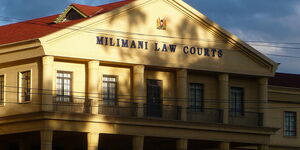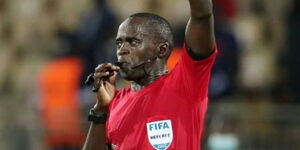Attorney General, Paul Kihara Kariuki, argues that the Independent Electoral and Boundaries Commission (IEBC) Chairman, Wafula Chebukati, cannot solely act on behalf of the Commission.
In an response filed at the Supreme Court on Saturday, August 27, the Kariuki argues that while IEBC is and independent constitutional commission established under Article 88 of the Constitution, Chebukati is an appointee of the Commission.
He cited Section 39 (3) of the Elections Act 2011 which states that the Commission shall announce the final results in the order in which the tallying of the results is completed.
The AG argues that while Article 138 the Constitution states that the IEBC Chairperson shall declare the results of the election of the President, it should not be interpreted to give Chebukati the ultimate power over other commissioners.
"An Act that renders Commissioners superfluous in the discharge of their constitutional duties in favour of either an individual Commissioner or a hired member of staff of a Commission would negate all known canons of constitutional and statutory interpretation," the AG stated in his response.
The government's legal advisor moots that there is a distinction between the roles of the Chairperson and those given to the Commission. He cited a ruling by the Court of Appeal in the Michael Sistu Mwaura Kamau v Ethics & Anti-Corruption Commission & 4 others [2017] case.
"It is clear from the provisions of both section 11(1) and 11(6) that the Act has separated the powers of the EACC and those of the commissioners. It is crystal clear to us that the functions of investigating and making recommendations to the DPP belong corporately to EACC and not to the secretary or the secretariat alone," Kariuki argued.
Kariuki reckoned that the law intentionally recommended that commissions are unevenly constituted for the purpose of decision making by a majority - a decision which is regarded as that of the Commission.
"That Constitution provides for an uneven minimum and maximum number of Commissioners, which speaks to provision for majority and minority in case of voting in the absence of consensus."
The Attorney General pleaded with the Supreme Court to consider various principles of interpretation of the law before making its final ruling.
Among them is interpretation based on the text and the context, where, the intent and purport of the Constitution, the objectives and aspirations, as well as the mischief to be remedied, are also brought into focus.
He recommended the principle of harmonious interpretation - no one provision of the Constitution is to be segregated from all the others to be considered alone, but all provisions bearing on a particular subject are to be brought into view and to be interpreted as to effectuate the general purpose of the instrument.
Other principals include the purposive approach to legislative interpretation where if the literal words used in a statute create an ambiguity, the court is free to look beyond the words themselves, and consider the historical context underpinning the legislation.
The principal of a holistic interpretation which is a contextual analysis of a constitutional provision, reading it alongside and against other provisions.
This is to maintain a rational explication of what the Constitution must be taken to mean in light of its history, of the issues in dispute, and of the prevailing circumstances.
The AG fronted that principles such as presumption against absurdity; the presumption against unworkable or impracticable result, presumption against anomalous or illogical result and the presumption against artificial result should also be considered.












